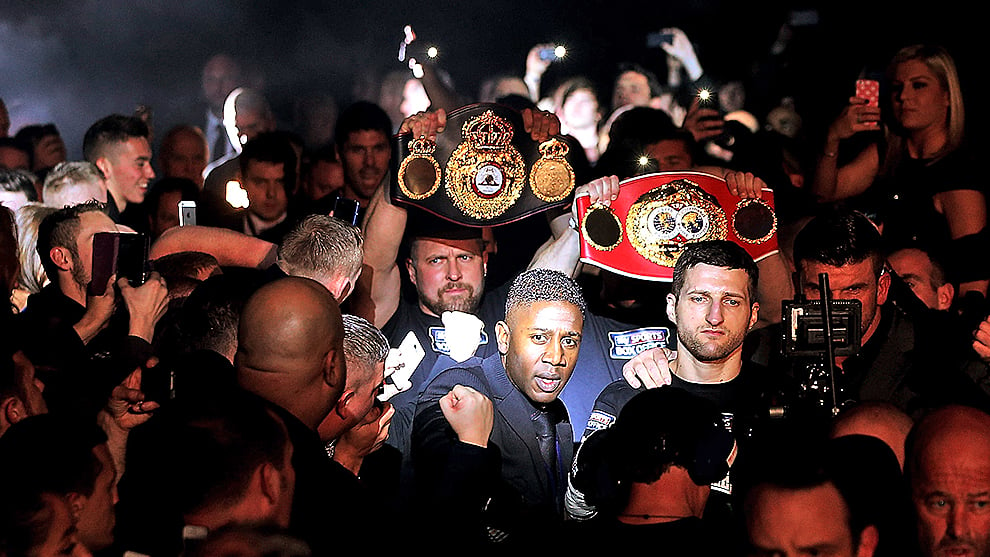By Elliot Worsell
SPEND time in a boxer’s changing room on fight night and you will come away not only certain there are few environments as tense or nerve-wracking but equally certain the success of a boxer has as much to do with controlling their mind ahead of a fight as controlling their body once the bell rings. It is a terrifying, fascinating experience, both for the boxer and bystander, and merely witnessing it will reveal more about the boxer – and all boxers – than every interview, press conference and pre-fight documentary combined.
In order to survive in a boxer’s changing room, one must master the art of staying quiet and resist speaking out of turn. One must also understand that the boxer, contrary to what their smile and any small talk might suggest, is preparing for a fight and will therefore be riddled with nerves, apprehension and, yes, some degree of fear. This will manifest in various ways and will be easy to detect if one is both quiet and paying attention. Yet, whether obvious or not, nerves and fear are not things spoken about and are still for some reason considered taboo in a sport like boxing.
Indeed, a boxer will often be asked about nerves or fear, either at a press conference or during an interview, and will typically respond the same way every time: “No. Not me.” They say it quickly and instinctively, almost as though to admit to nerves is to reveal a weakness or somehow enhance the power of their opponent. But, in the end, the lie makes little sense, for nerves are universal and something every boxer experiences. Moreover, nerves are one of the few things two boxers preparing for a fight will undoubtedly have in common.
“Early on in my amateur career the nerves leading into a fight were horrific,” said former WBA, WBC and IBF super-middleweight champion Carl Froch. “I used to get to the venue and think to myself, Why do I box? Why do I keep doing this to myself? Most of the time I didn’t want to be there. I didn’t want to keep putting myself through the trauma of preparing my mind for a fight. It was the most terrifying thing I did as a kid.”
When he first entered Gedling’s Phoenix ABC (Amateur Boxing Club) at nine years of age, Carl Froch was small, skinny, weak and, worst of all, unsure. His role models in boxing were Barry McGuigan, Nigel Benn and Chris Eubank, but he also admired snooker player Steve Davis and Nottingham football hero Brian Clough and was clearly keen to keep his options open.
His first fight at 10 was little more than a trial, a taster. It was not perceived to be the start of some great adventure and it was not something Froch particularly wanted to make a habit of doing, either. In fact, by the age of 15 he had found other interests and boxing, this scary pastime, was booted under the bed and soon forgotten. He had moved to Newark around that time, away from Phoenix ABC and all it offered, and experienced no itch to return to boxing until he started watching ‘Prince’ Naseem Hamed on television. Somehow Hamed made a dangerous sport appear almost fun and Froch, now 19, was tempted back.
“When I started boxing for England, I lacked self-belief and put a lot of pressure on myself to win fights and impress,” said Froch, who, as an amateur, won a bronze medal at the 2001 World Championships in Belfast. “I always had the bigger picture in my head: I had to win fights, impress the selectors, progress to the Olympic qualifiers and then qualify for the Olympics and win a medal on television. There was this long process of pressure and expectancy and, for the most part, the pressure was self-applied. I became nervous before fights simply because there was so much riding on success. I didn’t want to let anybody down.”
Froch, 33-2 (24), turned professional in 2002 and won five fights that year, five the following year, and four in 2004, a year in which he also secured the British super-middleweight title with a one-round demolition of Damon Hague. “As a pro, my nerves settled a bit as a result of winning,” he said, “and self-belief grew along the way. It soon felt like I was treading the same old path each time I prepared for a fight. I knew that I’d been here before and had experienced these same nerves but had still performed and won.
“When you’re a kid you just assume that because you are nervous you’re going to get your a**e kicked. In reality, though, so long as you can handle those nerves, they will only make you fight better.
“Put it this way, after a while I no longer walked around nervously before a fight asking everybody in the changing room how long we had until showtime. Twenty minutes, is it? Okay, let me check my laces. Oh no, my laces don’t feel right. Let me tie them again so they feel like winning laces.
“Fighters go through situations like that in their head before a fight and it only goes away with experience. Thankfully, I got to a point where I could just sit calmly in the changing room and not worry about anything. I’d give a little nod here and there when I needed something, let’s say a bottle of water, and would then ease my way towards a sweat with some shadowboxing or pad work. It became a process I had been through many times.”
